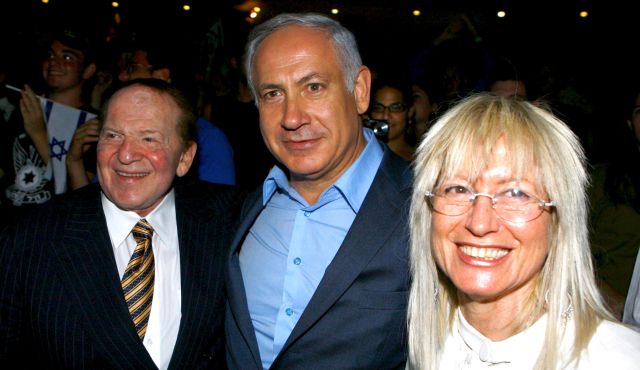by Eli Clifton
A high-profile list of U.S. non-proliferation, nuclear policy, Iran, and national security experts welcomed last week’s announcement of a deal between the P5+1 and Iran to curb Tehran’s nuclear program . Opponents of the deal, meanwhile, will make a last-ditch effort to derail the agreement reached in Vienna. They will use the 60-day congressional review period to pressure members of Congress, many of whom owe their seats to casino magnate Sheldon Adelson, to vote to reject the deal.
The groups leading this charge may be coming from a point of disadvantage. After all, it’s a tall task to convince Congress to sabotage an agreement negotiated by the U.S., as well as its closest European and NATO allies. But the budgets behind these groups will no doubt amplify their voices, giving them an outsized influence during the next two months.
Taken together, eight of the most vocal groups opposing the Iran deal enjoyed a combined 2013 budget (the last year for which records are publicly available) in excess of $145 million. That’s hardly insignificant number, especially compared to other foreign-policy lobby groups..
Here’s a breakdown of those groups, their 2013 budgets, and their anti-deal statements, issued either by the organizations themselves or their leadership:
The American Israel Public Affairs Committee (AIPAC)
2013 budget: $64,367,763
Anti-deal statement: “Congress should reject this agreement, and urge the administration to work with our allies to maintain economic pressure on Iran while offering to negotiate a better deal that will truly close off all Iranian paths to a nuclear weapon.”
2013 budget: $58,137,559
Anti-deal statement: “We are deeply disappointed by the terms of the final deal with Iran announced today which seem to fall far short of the President’s objective of preventing Iran from becoming a nuclear weapon state.”
Annual budget: $7,165,162
Anti-deal statement: “Today’s announcement of this nuclear agreement with Iran is a realization of the deepest fears and the most dire predictions of skeptics who have, for two years, been warning against exactly this outcome—a bad deal that both enriches this tyrannical regime and fails to strip Iran of nuclear weapons capability.”
The Foundation for Defense of Democracies
2013 budget: $7,108,010
Anti-deal statement: “Ayatollah Khomeini would be proud of his successors, committed revolutionaries and skilled diplomats who, through guile and determination, have out-negotiated the envoys of the ‘Great Satan,’ thereby preparing the ground for the many battles—not just diplomatic—yet to come.”
Zionist Organization of America
2013 budget: $3,909,965
Anti-deal statement: “This agreement will provide nuclear weapons and hundreds of billions of dollars to Ayatollah Ali Khamenei, the Hitler of the Mideast, and to Iran, the Nazi Germany of the Middle East.”
2013 budget: $3,062,340
Anti-deal statement: “This deal meets zero of the criteria for a good deal—it is not enforceable, verifiable, or in America’s national security interest. Unless Congress stops it, the world will be less safe as the United States will remove sanctions on Iran, and in return, Iran will still pursue nuclear weapons. The Republican Jewish Coalition calls on all members of Congress to reject this deal.”
2013 budget: $1,223,566
Anti-deal statement: “Anytime you give $150 billion, minimum, and then all the revenue that’s generated by the influx of business as sanctions are relieved, it will embolden a regime that’s already emboldened in the region and it doesn’t take that much money to fund Hezbollah, Hamas and I think we’d be naïve to think that none of that money will benefit their hegemonic ambitions.”
Emergency Committee for Israel
2013 budget: $708,385
Anti-deal statement: “Brilliant Obama diplomacy: In exchange for billions of dollars & removal of sanctions, Iran has agreed not to dismantle its nuclear program.”
These organizations, only a short list of the groups opposing the Iran deal, had a combined 2013 budget of $145,682,750. And that doesn’t even begin to take into account the tens of millions of dollars being spent through various dark-money groups to run television commercials and newspaper advertisements. AIPAC, for instance, says it will spend an additional $20 million through a newly formed advocacy group, Citizens for a Nuclear Free Iran. And the Emergency Committee for Israel last year routed nearly $1 million to support Tom Cotton’s Senate campaign, more than the ECI c4’s entire budget in 2013.
With Netanyahu threatening to “kill himself” to prevent a deal, and his wealthiest U.S. backer, Sheldon Adelson, apparently willing to provide critical campaign cash to Republican members of Congress and presidential hopefuls, neither Netanyahu nor the GOP will likely back down in the next 60 days. The White House is headed toward a battle with an extremely well endowed set of opponents.
UPDATE
Here’s a comparison of budgets between anti-deal and pro-deal groups.
Photo: Sheldon and Miriam Adelson flank Benjamin Netanyahu






Corrupt to the core!
Only Jewish organizations are listed here, why? Are there no rich Republican organizations involved? Have the Saudis and Kuwaitis gone broke? This is the sort of distorted reporting that promotes Antisemitism.
@Stan Nadel. These are the top donors. It’s not the reporters fault they are Jewish–he can’t make up non-Jewish ones to please you!
There is no indication that any non Jewish opponents of the deal have been considered or that these are just the “top donors” (donors to what?) from a longer list. You are reading into this what you want in order to ignore the bias.
These are simply described as “eight of the most vocal groups” with no claim that they are “top donors” or that they are a selection from a longer list. So once again it looks like the selection criteria included Jewish only.